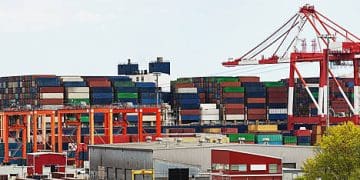Supply Chain Report – 10/08/2025
Corporate leaders across the United States are voicing concern over the potential economic impact of new tariffs introduced by President Donald Trump’s administration, warning that the measures could raise prices, strain supply chains, and challenge long-term growth.
According to KPMG’s latest U.S. CEO Outlook survey, which polled 400 chief executives of companies with at least $500 million in annual revenue, 86% of CEOs said they expect to increase prices for their goods and services to offset the added costs from tariffs.
Tim Walsh, CEO of KPMG U.S., told Yahoo Finance’s Opening Bid that business leaders are “concerned” about how the evolving trade policies will affect their operations. “CEOs are needing to react as it relates to their tariffs [and] their supply chains. They’re doing cost takeout to react to that additional cost,” Walsh said.
Rising Tariff Pressures
The findings come as President Trump intensifies his trade stance. Earlier this week, he announced a 25% tariff on all medium- and heavy-duty trucks imported into the U.S., set to take effect on November 1. The announcement, made via Truth Social, is part of a broader policy initiative to strengthen domestic manufacturing. Mexico, currently the largest exporter of these trucks to the U.S., is expected to be among the most affected.
The KPMG report warns that the new tariffs could squeeze profit margins, increase production costs, and ultimately lead to higher consumer prices. Nearly 9 in 10 CEOs (89%) said tariffs will significantly impact their business performance and operations over the next three years.
In anticipation, many companies are already modifying their sourcing strategies to minimize exposure. The survey found 85% of executives are adjusting their supply chains by moving more production and material sourcing to the U.S. These strategic shifts are particularly visible in the retail, technology, automotive, and manufacturing sectors.
Expanding Trade Policy
The current tariff policy follows Trump’s earlier “Liberation Day” tariffs, introduced in April, which reshaped U.S. trade rules. The framework imposed a 10% baseline duty on most imports, with higher “reciprocal” tariffs for countries that maintain trade surpluses with the U.S.
Under the policy, China faces tariffs above 30%, while Brazil and India are subject to 50% duties on certain goods. The European Union agreed to a 15% tariff rate as part of a trade adjustment deal reached in August 2025.
Additional product-specific tariffs include 50% on steel, aluminum, and semi-finished copper, and 25% on automobiles and parts. The U.S. also ended its “de minimis” exemption, meaning all imported goods — including packages under $800 — now face customs duties and processing fees.
Mixed Corporate Reactions
While some business leaders have raised alarms, others view the tariffs as an opportunity to strengthen U.S. industries. Ford Motor Company CEO Jim Farley expressed concern that the measures are limiting domestic investment potential. Speaking at the Ford Pro Accelerate conference in Detroit, Farley said tariffs have created a $2 billion financial headwind, preventing the company from investing even more heavily in American facilities.
Conversely, Union Pacific CEO Jim Vena voiced support for the administration’s trade and reshoring policies, calling them “great for the economy” and beneficial to long-term competitiveness.
Economic Outlook Remains Positive
Despite growing uncertainty, U.S. corporate leaders remain largely optimistic about economic performance. According to KPMG’s survey, 84% of CEOs are confident in their own company’s growth prospects, while 74% maintain a positive view of the global economic outlook over the next three years.
When asked about near-term challenges, executives identified supply chain resilience (34%), cybersecurity (29%), and global economic volatility (25%) as their top concerns. Many leaders also cited workforce development and digital transformation as key strategic priorities in managing these risks.
Investing in Technology Amid Uncertainty
Interestingly, even as tariffs and inflation pressures mount, a majority of CEOs plan to maintain or expand technology investments. Roughly three-quarters (74%) said artificial intelligence (AI) remains a top investment focus.
Walsh noted that many organizations are beginning to see tangible results from AI implementation. “CEOs are starting to see that AI come through — they’re starting to see agents and what the impact on their businesses can be,” he said. “But now there is also this impact on how and what companies are delivering in the market that will also be influenced by these technologies.”
As the tariff environment continues to evolve, U.S. companies appear focused on balancing policy adaptation with innovation — seeking to protect profitability while investing in digital tools that can enhance resilience and efficiency.
#TradeNews #TariffUpdate #USBusiness #EconomicPolicy #SupplyChainNews















